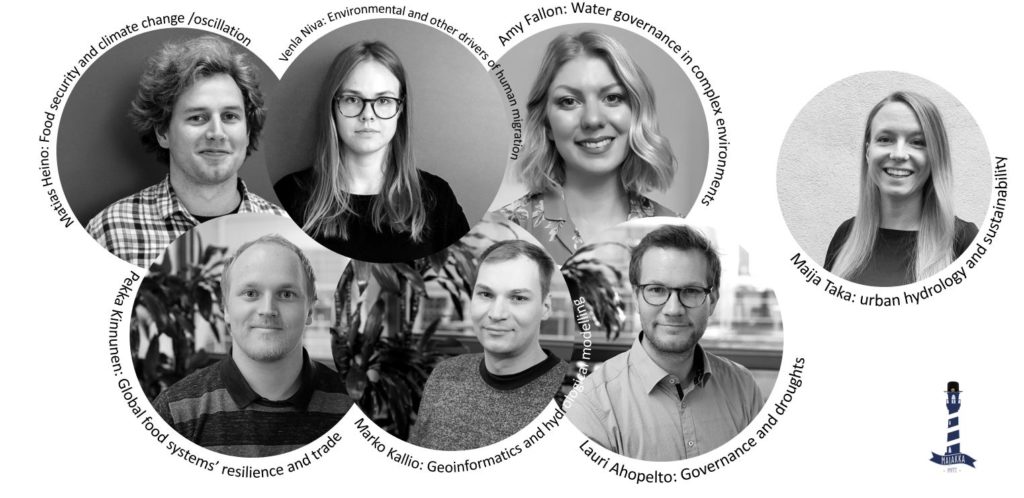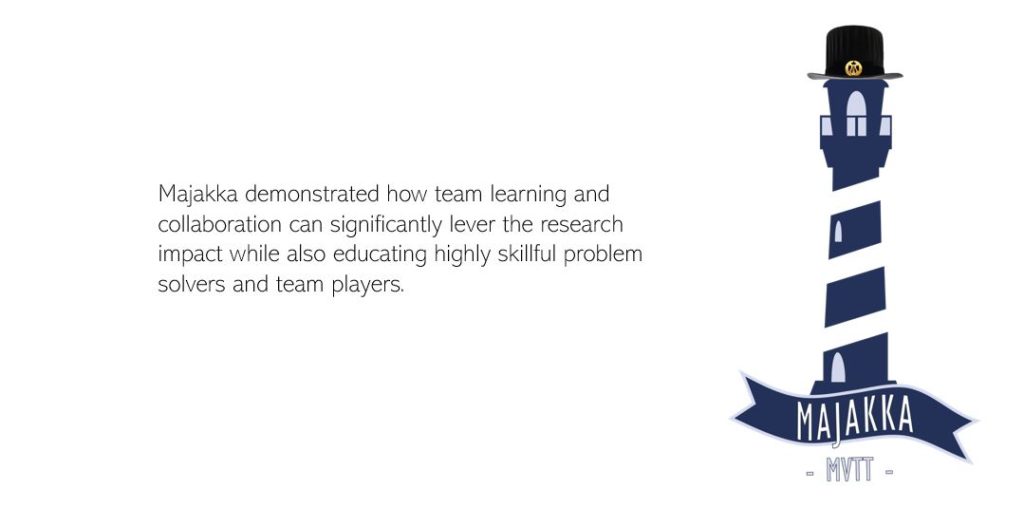In this post we summarize the final report of MVTT’s impact assessment of the Majakka project. The synthesis can be found in Finnish from MVTT’s home page. The assessment was performed by Gaia consulting.
For the past five years (2017-2021), our WDRG research group has paid special attention in researching and developing doctoral education in water engineering. The main objective was to develop a more systematic model for doctoral education and for collaboration. The project, funded by Maa- ja Vesitekniikan tuki ry (MVTT) was named Majakka (lighthouse) to provide guidance and direction for the doctoral students and their supervisors in the rough seas of doctoral education. MVTT’s 2Me donation enabled us to design and pilot new practices and develop mindsets that were then upscaled from the Majakka project (seven people) to Water and Development Research Group (30 members) and to Water and Environmental Engineering (60 members). We focused on initiating peer learning and strengthening peer learning and psychological safety in the team. Read more from the project home page.
One of the key aspects was the project coordinator, who was observed to significantly contribute to the group cohesion and commitment throughout the project. The work culture favored modern-day collaboration over research in isolation. The impact assessment also highlights how these modern ways of working are pivotal in solving grand environmental and societal challenges we are and will face in years to come. These grand challenges can’t be solved without collaboration of PhDs.

Increasing of doctors in non-academic positions
Despite the doctoral degree is a basic condition for research in international communities, alarmingly only 6% of research and development professionals in Finland hold a doctors degree. In the Finnish water industry doctor degrees are underrepresented. However, the current sustainability transformation calls for highly competent professionals how have diverse abilities and holistic understanding of the multifaceted challenges in climate and environmental change, population growth, urbanization and pandemics, to name a few. All these have direct and indirect impacts on Finnish water water resources.
Outputs
If we only focus on figures, Majakka project produced 6 doctoral dissertations, 46 peer-review international journal articles, 10 conference publications, 22 master theses, and 9 bachelor theses all focusing on water sustainability. Further, the project received two Aalto awards: Aalto Excellence
Recognition in 2018, and Aalto Pioneering Excellence in 2021 for its work in enabling excellence.
Let’s go beyond figures. The key aspect of a successful doctoral degree process was the sense of community. The small community with strong cohesion provided continuous peer support and evidence-based knowledge about the uncertainties along the process. For example, knowledge about the journal’s review processes was critical in planning their own work and increasing resilience. Collaboration also enabled networking and stakeholder engagement as a group, and Majakka successfully collaborated with several ministries and other public actors and research institutes.
The five-year full funding was another critical factor enabling a high quality research and learning. MVTTäs funding reduced internal competition of funding and strengthened the team spirit. Both doctoral students and supervising professor was especially thankful for the budget on conferences and international research visits that strongly supported networking and collaboration.

The impact
Majakka sure has a long-term impact. The findings and outputs are now advanced and upscaled in Aalto University. Project’s coordinator Maija Taka collaborated in designing a pedagogical course for supervising professors and is teaching in the course in spring 2022. In her current position as an academic coordinator she focuses on research-based doctoral education development and in upscaling the Majakka findings to the whole School of Engineering. One of the goals is to initiate new interdisciplinary collaboration with water engineering.
The academic impact comes through the high-level research publications and knowledge in the field. All WDRG strongly focuses on high-level collaborative research and open access data and publications. Further, Majakka has significantly helped the research group and water engineering in Aalto and in the wider academic community.
The societal impact stems from the active engagement with governance and sectoral research institutes. Active external communication has directed research and produced relevant knowledge for the end-users, and supported the employment of doctors into highly demanding societal positions. Further, the project successfully helped international professionals to integrate into Finnish society and water sector, and to help them stay in Finland after their graduation.
This summary post was written by Majakka’s former coordinator, PhD Maija Taka.

